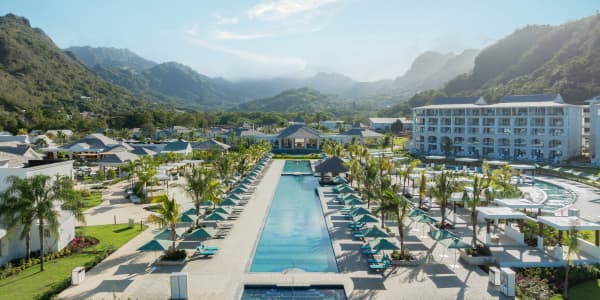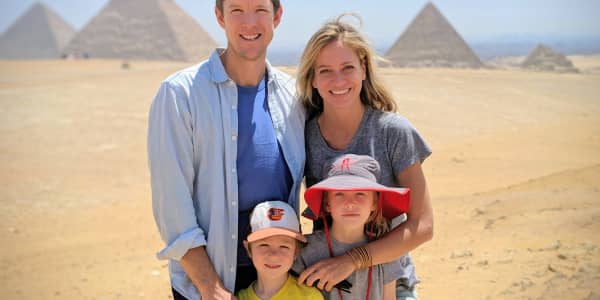After closing its borders six months ago, South Africa is scheduled to reopen to international travelers on Oct. 1.
Kruger National Park and the country's winery-laden Western Cape — which includes the capital city of Cape Town and its most famous natural wonder, Table Mountain — will likely dominate travelers' itineraries. But there are other parts of the country that offer secluded, socially-distanced experiences for those who are willing to venture beyond the usual tourist routes.
One such place is KwaZulu-Natal, South Africa's eastern-most province. There travelers who want to be immersed in nature and who have a yen for conservation can stay at a private game reserve that allows guests to participate in efforts to protect local rhino and elephant populations.
Combating poachers
It's estimated that three rhinos are poached every day in South Africa. In the whole of Africa, an elephant is poached approximately every 15 minutes. With only 18,000 white rhinos and 400,000 elephants left in Africa, in 20 years' time at current rates, both animals will be completely gone.
Private game reserves in KwaZulu-Natal, such as &Beyond Phinda Private Game Reserve and Nambiti Private Game Reserve, are trying to change that. Each has accommodations that range from comfortable to luxurious, and cuisine that varies from good to outstanding.
Apart from the Big Five — lion, leopard, rhinoceros, elephant and Cape buffalo — Nambiti is home to giraffes, zebras, blue wildebeests and many varieties of antelope. Night drives reveal nocturnal animals such as porcupines, aardvarks, hyenas and civet cats.
For Manager Mike Potter, security against poachers is his biggest budget item — more expensive than roads, fences or looking after the animals.
"It's financially crippling," he said, "but we have to do it."
Poachers are mainly locals who work with syndicates from Mozambique. A total of five rhinos have been poached from Nambiti, three of them in February 2013.
"The poachers came in by helicopter," said Potter. "We could see where they had landed."
Security was dramatically increased, and since then no rhinos have been lost. Lodge guests pay a daily rhino levy of 50 South African rand ($3), which helps the cause.
Nambiti is part of the World Wildlife Fund's Black Rhino Range Expansion Project, which aims to boost the rare black rhino population in South Africa. The WWF funds Nambiti's team of four rhino monitors, who track the animals' movements via motorbike. An annual grant of about $5,000 covers the cost of their bikes, boots, binoculars and other equipment.
"We download all the animal positions weekly," Potter explained. "If we haven't seen one of them for a week or two, we focus on finding it."
The job isn't easy either. "These men are vulnerable to being chased by angry black rhinos or attacked by lions," said Potter.
Though it's sad to see a dehorned rhino, Potter agrees that "dehorning" them — removing their horns so they won't be targeted by poachers — is the best way to protect the animals. But at approximately $2,400 for each rhino dehorning expedition, it's hugely expensive.
That is where conservation-minded travelers can get involved. It's possible to participate in rhino dehorning by paying a fee to join a team, usually arranged through a tour company.
That contribution covers the helicopter, pilot, wildlife vet and drugs involved. At the end of the day, travelers return to their luxury lodges with the satisfaction of having helped to protect a rhino's life.
An academy on Shaka-Zulu's hunting grounds
Thula Thula (pronounced "tula tula") is a Zulu name that means "peace and tranquility." It's also the name of a game reserve located on the historic hunting grounds of King Shaka, founder of the Zulu empire. The reserve is famous for its conservation work, its herd of 29 elephants and its charismatic ex-Parisian owner, Françoise Malby-Anthony.
She and her late husband, Lawrence Anthony, founded the Thula Thula Private Game Reserve in 1999 with a troubled herd of just seven elephants. When he died in 2012, she took over the management of the reserve, expanding it and establishing a rehabilitation center for orphaned animals.
To fix problems affecting wildlife, said Malby-Anthony, we must address human problems. Not only has powdered rhino horn been used in Chinese Traditional Medicine for thousands of years, but it is used today to display wealth and status.
"Seventy percent of Chinese people do not know that the rhinos and elephants are killed for their horns," she said.
It's vital that local people be involved in conservation, she said, so all of Thula Thula's staff comes from nearby communities.
Visitors come from around the world, but mainly from the United States, Europe and, of course, South Africa. Accommodations are in two lodges — one of which is a luxury tented camp — and income from those finance the reserve's conservation efforts.
Twice-daily game drives — usually in the morning and evening — are the highlight of any lodge stay.
"These safaris are guided by our experienced game rangers, who share their knowledge and their passion, raising awareness of environmental issues and the necessity to protect endangered species," said Malby-Anthony.
Thula Thula Volunteers Academy is a different form of eco-tourism. The academy holds regular two-week stays for eight volunteers at a time. Volunteers work as conservation assistants, the idea being that they will not only contribute to the work on the ground, but also go home and spread the message.
"I used to think that a rhino without a horn was not a rhino," said Malby-Anthony. "But I changed my mind in February 2013 when five heavily armed men killed two of our rhinos — both were only 18 months old and still with such small horns."
"Since then, we have deployed intensive anti-poaching and security measures to keep our wildlife safe," she said. "This is our priority."
Thula Thula's dog unit patrols 24 hours a day, and a plane comes weekly to check the fences. When she had surveillance cameras installed, the elephants removed them because they didn't like foreign objects in the trees. The solution was to apply a hot chili paste all around the camera.
"That did the trick — elephants don't like chili at all," said Malby-Anthony.
The all-inclusive daily rate depends upon your country of origin: $120 for those from North America, South America and Asia, $153 for Brits, $140 for Europeans and $70 for South Africans. This fee goes to Thula Thula's conservation projects, including the expansion of its elephant habitat and anti-poaching measures.
Two books that explore the challenges of animal conservation include "The Elephant Whisperer" by Malby-Anthony's late husband Lawrence, and its sequel "An Elephant in My Kitchen," penned by Malby-Anthony herself.
"It's a wake-up call to the tragic situation of our wildlife in Africa," she said. "In 20 years' time, when there are no more elephants, rhinos, lions and cheetahs, we cannot say we did not know."
Correction: This story has been updated to remove an editing mistake that inaccurately described rhinos' horns.





